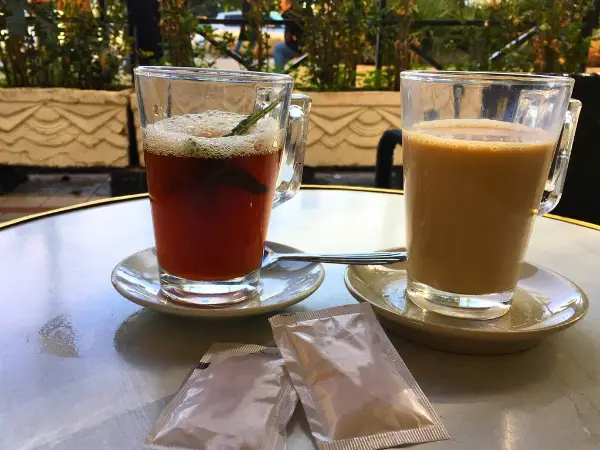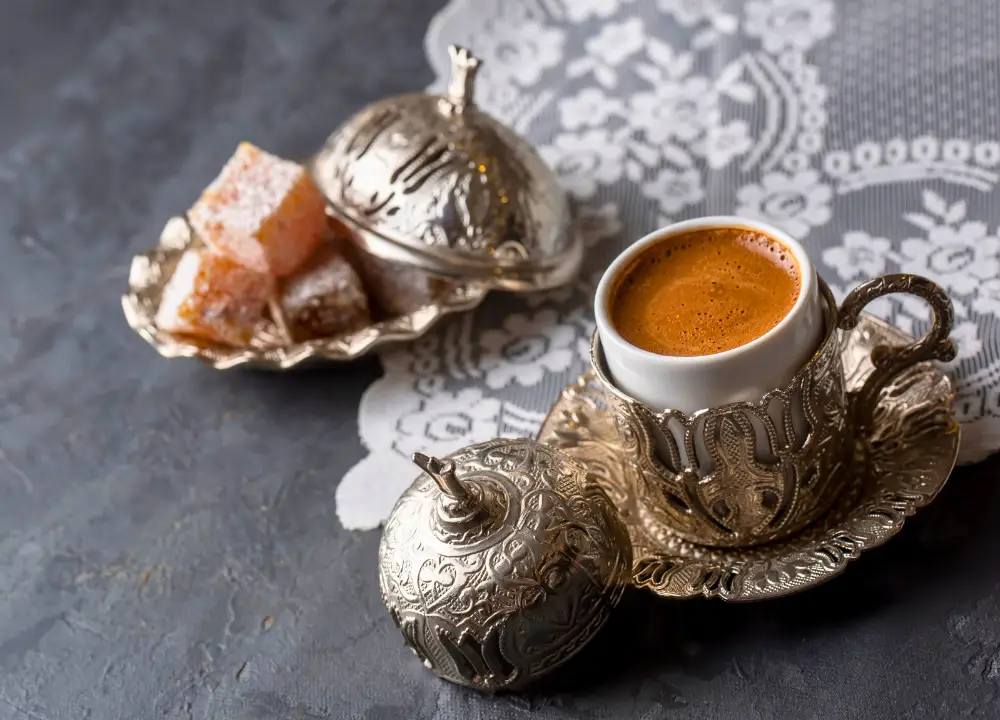Discover the history, culture, and flavors that make this beverage so special. Join us on a journey through the heart of Algeria, where coffee is truly a cherished ritual.
What Is Algerian Coffee?
Algerian coffee is more than just a beverage. It is a blend of rich history, culture, and flavor. Known for its unique preparation and taste, Algerian coffee reflects the country’s diverse influences.
Origins Of Coffee In Algeria
The story of coffee in Algeria dates back centuries. Coffee arrived in North Africa through trade routes. It quickly became popular among the local population.
Here are key points about the origins of coffee in Algeria:
- 15th Century: Coffee introduced through the Ottoman Empire.
- 16th Century: Coffeehouses emerged in cities like Algiers.
- 19th Century: French colonization brought new coffee varieties.
Algerians developed their own style of coffee. Traditional methods include:
- Using dark-roasted beans.
- Brewing with a special pot called a “cafétière.”
- Sweetening with sugar or spices like cinnamon.
Table 1 outlines the types of coffee popular in Algeria:
| Type of Coffee | Description |
|---|---|
| Café Noir | Strong, black coffee without milk. |
| Café au Lait | Coffee mixed with hot milk. |
| Café Turc | Strong coffee brewed with sugar and spices. |
This rich history shaped the coffee culture in Algeria. It highlights the blend of local and foreign influences.
Evolution Of Coffee Consumption In Modern Algeria
Young people often seek new experiences. They enjoy trying different flavors and brewing methods. Traditional Algerian coffee remains popular, but:
- Cold brews and iced coffees are becoming trendy.
- Flavored syrups and international styles are being embraced.
Social gatherings often feature coffee as a central element. It serves as a way to connect with friends and family. Coffee is more than a drink; it symbolizes hospitality and warmth.
With this evolution, Algerian coffee retains its cultural significance. It remains a cherished part of daily life.

Cultural Significance Of Algerian Coffee
From family gatherings to social events, coffee plays a key role. The rich flavors and unique preparation methods reflect the heart of Algerian culture.
Coffee In Daily Algerian Life
Coffee is a daily ritual in Algeria. It brings people together, whether at home or in cafes. The strong, aromatic brew is often enjoyed throughout the day. Here are some key aspects of coffee’s role in daily life:
- Morning Boost: Algerians start their day with coffee for energy.
- Social Gatherings: Coffee is served during family visits and celebrations.
- Work Breaks: Coffee breaks are common among friends and coworkers.
In many households, coffee preparation is an art. The traditional method involves:
- Boiling water in a special pot called a moka pot.
- Adding finely ground coffee.
- Letting it brew for a few minutes.
- Pouring it into small cups.
The taste of Algerian coffee is distinct. It blends flavors of spices, sugar, and sometimes even orange blossom water. This unique mix makes each cup special.
In cafes, coffee culture thrives. People sit for hours, discussing life and politics over steaming cups. It fosters community and connection, making coffee an essential part of daily life.
Symbolism Of Coffee In Algerian Culture
Coffee carries deep meanings in Algerian culture. It symbolizes hospitality, friendship, and respect. Serving coffee to guests is a sign of welcome.
Here are some symbolic aspects of coffee:
- Hospitality: Offering coffee shows generosity.
- Connection: Coffee builds bonds between friends and families.
- Tradition: Preparation methods are passed down through generations.
Coffee ceremonies are significant. They highlight important moments:
| Occasion | Significance |
|---|---|
| Weddings | Coffee is served to celebrate unity. |
| Funerals | Coffee is shared to honor the deceased. |
| Festivals | Special blends are created for celebrations. |
Through these ceremonies, coffee becomes a part of life’s most important events. It illustrates the values of community and connection in Algeria.
The Unique Taste Of Algerian Coffee
The unique taste of Algerian coffee mixes strong flavors with local spices. This blend makes each cup a memorable experience. From family gatherings to social events, coffee plays a central role in Algerian life.
Spices And Additives In Algerian Coffee
Algerian coffee stands out because of its special spices and additives. These ingredients give the coffee its rich flavor. Common spices used include:
- Cardamom: Adds a sweet and spicy aroma.
- Cinnamon: Brings warmth and depth to the flavor.
- Cloves: Offers a strong, aromatic taste.
Some people also add sugar to enhance sweetness. Others prefer to use milk, creating a creamy texture. The combination of these spices transforms simple coffee into a flavorful drink.
Here’s a quick look at how different spices change the flavor:
| Spice | Flavor Profile |
|---|---|
| Cardamom | Sweet, aromatic |
| Cinnamon | Warm, slightly sweet |
| Cloves | Strong, spicy |
Each spice adds its unique touch, making every cup of Algerian coffee a personal experience. You can adjust the spices based on your taste. This flexibility makes Algerian coffee special to many.
Brewing Techniques
Brewing Algerian coffee is an art. It requires attention and care. Traditional methods bring out the best flavors. Here are common brewing techniques:
- Using a Dallah: This is a traditional coffee pot. It allows for slow brewing, enhancing the flavors.
- French Press: Many use this method for its simplicity. It’s easy and quick.
- Stovetop Espresso Maker: This method gives strong coffee with a rich taste.
Each method has its charm. The Dallah, with its long spout, allows pouring without spilling. The French press captures the coffee’s essence, while the stovetop maker provides a robust flavor.
For a perfect cup, follow these steps:
- Start with freshly ground coffee.
- Boil water and let it cool slightly.
- Add coffee and spices to the water.
- Let it steep for a few minutes.
- Serve hot, and enjoy!
The brewing technique influences the taste. Experiment with different methods to find your favorite. Each brewing style can change the flavor profile, making your experience unique.
The Role Of Coffeehouses In Algeria
Coffeehouses, or “café,” play a vital role in Algerian life. They serve as social hubs where friends gather, stories are shared, and traditions are kept alive. In these spaces, coffee brings people together.
Historical Coffeehouses
The history of coffeehouses in Algeria dates back to the Ottoman Empire. These establishments became popular in the 16th century. They served as places for people to gather, discuss politics, and enjoy music. Over time, coffeehouses evolved into essential social venues.
Key features of historical coffeehouses:
- Social Interaction: They provided a space for community engagement.
- Cultural Exchange: People shared ideas and traditions.
- Entertainment: Music and poetry were common.
During the French colonization, coffeehouses became symbols of resistance. They were places where nationalist movements thrived. People gathered to discuss freedom and independence. Today, these historical coffeehouses continue to embody Algeria’s rich cultural tapestry.
Here is a table highlighting notable historical coffeehouses:
| Name | Location | Year Established |
|---|---|---|
| Café de la Gare | Algiers | 1900 |
| Café El-Houari | Oran | 1920 |
| Café Timgad | Constantine | 1930 |
Famous Algerian Coffee Spots
Algeria is home to many famous coffee spots. Each place has its unique charm and history. Locals and tourists flock to these cafés for a taste of authentic Algerian coffee.
Some of the most popular coffee spots include:
- Café des Nattes: Located in Algiers, it is famous for its traditional atmosphere.
- Café El-Djazair: This café offers stunning views of the bay.
- Café Tonton: Known for its cozy ambiance and local pastries.
Visitors often enjoy:
- Traditional Coffee: A rich blend with a unique flavor.
- Pastries: Sweet treats that complement the coffee.
- Local Music: Live performances enhance the experience.
These coffee spots not only serve coffee but also represent Algerian hospitality. They invite everyone to sit, relax, and enjoy the moment.
Algerian Recipe (Mazagran Coffee)
Algerian coffee is a unique blend of history, culture, and flavor. One of the most famous Algerian coffee recipes is Mazagran coffee. Below you will see the recipe that I posted in the card. Enjoy!

How to Make Iced Algerian Coffee (Mazagran Recipe)
Equipment
- Coffee maker or espresso machine
- Lemon juicer
- Measuring Spoons
- Mixing spoon
- Glasses for serving
- Ice tray or store-bought ice
Ingredients
- 4 Tablespoons espresso grounds
- 2 Juice Juice lemons (about 1/2 cup)
- 6 tablespoons granulated sugar
- Ice
- Garnish: Lemon wheels
Instructions
- Start by brewing a strong espresso, which will serve as the base for your Mazagran. Use about 1 to 2 ounces of espresso per serving, adjusting according to your taste preferences. If you prefer a stronger coffee flavor, use more espresso; for a milder taste, use less. Once brewed, set the espresso aside to cool for about 30 minutes.

- Sweetening your espresso enhances its flavor and balances the natural acidity of the coffee. You can choose from various sweeteners:Sugar (white or brown)HoneyAgave syrupFollow these steps to sweeten your espresso:Pour the cooled espresso into a glass.Add your desired sweetener, starting with a teaspoon of sugar.Stir well until the sweetener dissolves completely.Taste and adjust the sweetness as needed.Remember, the sweetness should complement the coffee—too much can overpower the flavor.

- Cooling the espresso is crucial before mixing it with lemon juice. The lemon juice adds a unique flavor profile to the coffee. Here’s how to do it:Once the espresso is sweetened, allow it to sit at room temperature for a few minutes.Transfer the espresso to the refrigerator for about 15 to 20 minutes. This will chill it.After chilling, squeeze half a lemon into the espresso. Adjust based on your taste.Mix well to ensure the lemon juice is evenly distributed. The tartness of the lemon complements the coffee's richness. It creates a refreshing drink.

- The final step is to serve your Mazagran over ice. This makes the drink refreshing and enjoyable. Follow these steps:Fill a tall glass with ice cubes.Pour the cooled espresso and lemon mixture over the ice.Garnish with a slice of lemon or a sprig of mint for a nice touch.Enjoy your Iced Algerian Coffee immediately. The cold drink is perfect for hot days. The combination of coffee and lemon is unique. It will leave you feeling refreshed and satisfied.


